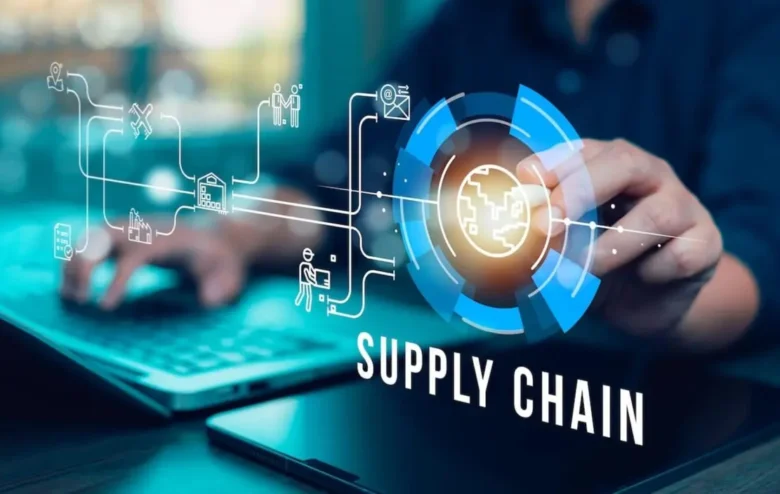In today’s fast-paced global economy, supply chains are the backbone of every industry. They move products from manufacturers to customers worldwide. But as supply chains become more complex, they are also more prone to inefficiencies, fraud, and difficult-to-follow processes. Customers, regulators, and businesses want greater accountability and improved traceability.
Decentralized technologies, particularly blockchain, are changing the way supply chains operate, making them more open, secure, and reliable. Decentralized solutions eliminate the need for intermediaries, reduce fraud, and ensure data accuracy. This new technology is more than just a term; it’s becoming a must-have for managing modern supply chains. Let’s explore how decentralized technology is transforming global logistics in real time.
Understanding Decentralized Technology in Supply Chains:
Decentralized technology means that the system runs on a decentralized network, without a central authority controlling data and decisions. In supply chains, this typically means the use of blockchain. Blockchain is a decentralized ledger that records transactions in a secure, public, and immutable manner. Everyone in the supply chain, from manufacturers to traders, can see the data recorded on the blockchain at every step. This openness allows companies to verify where goods come from, how they are processed, and whether relevant standards are being met. The result is a more responsible, efficient, and robust supply chain.
Enhancing Transparency and Traceability:
One of the major benefits of decentralized supply chain technology is that it simplifies information tracking. From sourcing raw materials to delivery, every step of the product journey can be recorded and viewed in real time. Blockchain can demonstrate that the coffee or clothing people buy is produced in factories with fair working conditions. This openness strengthens people’s trust in brands. It also helps companies quickly identify and resolve issues, such as contamination in the food supply chain or counterfeit medicines in the pharmaceutical industry.
Reducing Fraud and Ensuring Data Accuracy:
When many players from different sectors are involved, supply chains are more susceptible to errors, falsified documents, and inaccurate data. Using immutable records in decentralized technology can significantly reduce these risks. Information on the blockchain cannot be changed or deleted unless everyone in the network agrees. This approach makes it nearly impossible to alter the record. The system also ensures that everyone has the same accurate information to function. Decentralized platforms ensure that all information in the supply chain is accurate, whether it’s a shipping log, a compliance certificate, or an invoice.
Making it More Efficient and Cost-Effective:
Traditional supply chains involve numerous intermediaries, each with their database and means of verifying information. Delays, additional work, and higher prices often result from this. Companies can streamline these processes by using decentralized platforms. Smart contracts are agreements that operate autonomously on the blockchain. They automatically perform actions such as payment, inspection, and delivery according to defined parameters. This reduces the need for manual oversight and speeds up the process. Furthermore, there will be fewer disagreements because everyone has access to the same data. The cost savings and operational benefits can be enormous, especially for large global supply networks.
How Decentralized Supply Chains Work in Practice:
Many companies are already using decentralized technology to optimize their supply networks. For example, Walmart and other food companies have used blockchain systems to track food from farm to store. This improves food safety and speeds up food recalls. Fashion brands use blockchain to prove that their claims about sourcing products in a way that benefits the environment and people are accurate. Decentralized ledgers help pharmaceutical companies track medicines and ensure that counterfeit drugs don’t enter the supply chain. These real-world examples demonstrate the usefulness and flexibility of blockchain and decentralized solutions in a wide variety of areas.
Supporting Ethical and Sustainable Practices:
Consumers are more concerned than ever about the impact of their purchases. Decentralized technology allows companies to provide tangible proof of sustainable and ethical practices. For example, a clothing company can track organic cotton from the field to the store to ensure compliance with environmental and labor regulations. Similarly, fishing companies can confirm that the fish they catch is legal and sustainable. This traceability helps prevent “greenwashing,” illegal labor, and environmental pollution. Companies can protect their reputations and contribute to a more responsible global economy by implementing decentralized solutions.
Overcoming Implementation Challenges:
Although decentralized supply chains present numerous advantages, their widespread adoption faces several challenges. Applying blockchain technology to existing systems can be difficult and expensive. Companies must train their employees, upgrade their infrastructure, and ensure their systems are compatible with others. Furthermore, the lack of clear regulations in some regions may reduce the likelihood of investing in decentralized technology. These issues are, however, progressively going away as technology develops and its advantages become more apparent. Collaboration, standardization, and the establishment of public-private partnerships are essential to solving these problems and maximizing the benefits of open supply chains.
How Supply Chain Management Will Develop in the Future:
As the world becomes more digital and global, the need for open supply chains will only increase. Decentralized technology is likely to play a significant role in future logistics. Emerging technologies such as sensors for the Internet of Things (IoT), artificial intelligence (AI), and machine learning will significantly enhance the capabilities of blockchain networks. Real-time tracking, predictive analytics, and automated decision-making will become the norm. Companies that invest in these technologies now will be better equipped to address future challenges. They will have an advantage over their competitors because they will be more reliable, efficient, and flexible.
Conclusion:
Decentralized technology is more than just a cool idea for the future; it’s also an effective way to solve some of the biggest problems in supply chain management today. Decentralized systems make supply chains more open, fairer, and more robust by ensuring data accuracy, simplifying traceability, and building trust between all parties involved. Decentralization empowers businesses and customers to make informed choices and hold stakeholders accountable. As new ideas and industry changes continue to evolve, those who use decentralized solutions will be the smarter and more responsible leaders in enabling global trade. The path to open supply chains is open, and decentralized technology is leading the way.
FAQs:
1. What does using decentralized technology in the supply chain mean?
Blockchain and other decentralized technologies operate without a central authority, allowing everyone in the supply chain to share data clearly and securely.
2. How does blockchain promote supply chain transparency?
Blockchain permanently records every transaction, making it easier to track goods from source to destination and verify their authenticity and ethical origin.
3. Can decentralized technology eliminate counterfeit goods?
Blockchain can help industries, like pharmaceuticals and luxury goods, detect and eliminate counterfeit products by tracking them every step of the way.
4. Is it expensive to set up a decentralized supply chain system?
The initial implementation costs can be high, but the long-term savings from increased efficiency, reduced fraud, and fewer conflicts often make up for this.
5. What types of companies are using decentralized technology in their supply chains?
Food, fashion, pharmaceuticals, and electronics are just a few industries actively using decentralized systems to improve safety, traceability, and sustainability.




